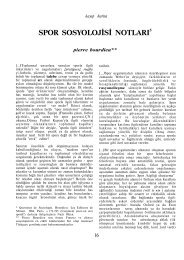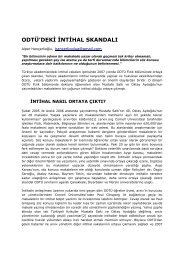Untitled
Untitled
Untitled
You also want an ePaper? Increase the reach of your titles
YUMPU automatically turns print PDFs into web optimized ePapers that Google loves.
64 THE SALARIED MASSES<br />
find themselves in difficulties is no consolation to those who have not<br />
been involved in the big game.<br />
Different from the mass of plaintiffs are all those employees who<br />
would like to be seen as such legally, but not socially: commercial<br />
travellers, �gents on commission, insurance brokers, publicity ladies,<br />
etc. Formerly they were officers or middle-class characters of modest<br />
independence. In the rationalized world of the salaried employee, these<br />
bourgeois ruins stand out strangely with their private feelings and whole<br />
bygone inner architecture. They would probably collapse completely if<br />
they did not sustain themselves with the thought that they were once<br />
something better. Things mostly go worse for them than for other<br />
employees. In disputes over expenses and commissions they appear<br />
before the Labour Court, which as we all know also has jurisdiction<br />
with respect to 'employee-like' persons. They lodge complaints there<br />
on their own initiative, personally injured private individuals seeking<br />
above all to give both themselves and others the impression that they<br />
are socially on a par with the masters. It is as though they still dwelt in<br />
their sold-off front parlours. Which is certainly where the elderly agent<br />
emerges from, who spices his conversation with Latin quotations and<br />
tells the Labour Court, among other things, that his son is in the upper<br />
sixth. Denied his commission because an order was not given, he claims<br />
that his predecessor alone was to blame for the mishap. 'Mr Chairman',<br />
he declaims, 'King Louis XV died for the sins of his predecessor. Must I<br />
now pay for those of mine?' 'It was Louis XVI', the chairman retorts.<br />
Incidentally, dispossessed big businessmen sometimes turn up among<br />
the employees made redundant and as such demand their rights. The<br />
chief clerk of one large firm is dismissed due to differences of opinion.<br />
The firm takes the opportunity to check back every penny he has used<br />
for private purposes. For example, he took coal from the factory and<br />
had domestic repairs done by workers - all of this is now brought up<br />
against him. But perhaps the ex-chief clerk is merely paying for the sins<br />
of his father, who was somewhat similar to Louis XV: i.e. the former<br />
owner of the firm, which later passed into other hands through a<br />
merger.<br />
Complaints follow one another in unbroken sequence. They are<br />
already sifted before they are brought forward: either by a court official<br />
in the registry or, more usually, by the employee organizations. On<br />
their way through the works council the majority of them simply come<br />
to the notice of the trade unions, whose interest is thereby engaged.<br />
From the fact that wherever works councils intervene actively they<br />
behave like union officials, one Labour Court chairman friend of mine<br />
infers the absence of company-union leanings among the employed.<br />
'Employees', he says, 'are individualists, or they are organized in trade






